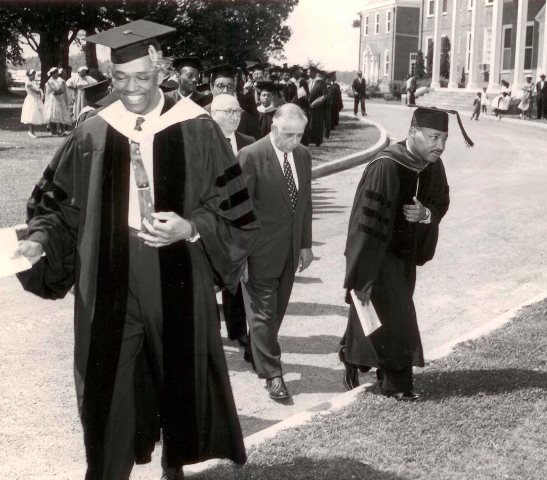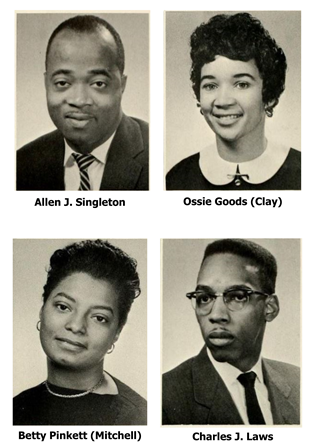
1959 alumni reflect on their encounter with Martin Luther King Jr.
Thursday, May 23, 2019
Charles Laws was a senior at Maryland State College in September 1958 when “Stride Toward Freedom: The Montgomery Story” by the minister of Dexter Avenue Baptist Church in Alabama’s capital city was published.
Laws read the book because its 29-year-old author, the Rev. Martin Luther King Jr., was an Alpha Phi Alpha fraternity brother.
Little did Laws know at the time that eight months later, he and 52 of his classmates would have the opportunity to shake King’s hand as they crossed the stage during graduation exercises.
“I remember thinking,” Allen J. Singleton said, “I’ll never wash this hand again.”
That was May 24, 1959, a warm Delmarva Sunday that alumni fondly recall 60 years on.
“When we heard Martin Luther King was going to be our speaker,” Singleton said, “You got all excited.”
“The next big thing was Dr. King – he was going to be there,” Singleton said, his voice trailing off.
King’s appearance drew an overflow crowd to the Depression-era gymnasium and environs. The civil rights leader was a driving force behind the 1956 Montgomery bus boycott that thrust his brand of non-violent protest into the nation’s consciousness – and made Rosa Parks a household name.

Each member of Maryland State’s class of 1959 was allocated two guest tickets. Laws estimates “two or three carloads” of his relatives came to Princess Anne and waited outside the now-demolished brick gym that lacked air-conditioning. Everyone was hoping to catch a glimpse of the charismatic King and listen through open doors and windows to what he had to say.
“We had all eagerly anticipated seeing Dr. King,” Ossie Goods Clay said. “When we finally spotted him before graduation, we were struck he was such a small man. He seemed taller on TV.”
King strode across campus that day accompanied by college President John Taylor Williams, an imposing six-feet-four — a height difference Clay acknowledged amplified her visual recollection.
“I can remember Dr. King and Dr. (E. Worthington) Waters were in front of us,” Betty Pinkett Mitchell said. “The music was playing. Everyone was swaying back and forth. It was very, very touching.”
Back then, Mitchell acknowledged recently, she did not grasp the historic importance of the moment or the speaker.
“I only heard about him later,” she said. “Oh, the feeling I had, though, that I had been in the presence of this man who sacrificed for this country.”
Singleton noted “a lot of people didn’t agree with (King) about his non-violent movement. But he talked about the impact of boycotting.”
Salisbury, Md.’s daily newspaper the following day quoted King as saying, “The Negro stands on the border of the promised land of integration. The new order brings new responsibilities, challenging him to make the world spiritually one as well as geographically one.”
If King spoke from prepared remarks, those in the audience could not detect it.
“It was clear” to Laws, at least, “that he spoke from his heart.”
King’s “very authoritative voice,” commanded everyone’s attention, Laws said. “You could also feel his sincerity in his delivery.”
Mitchell said she can still hear the “sound of his voice. He had something in him – some kind of spirit. When he spoke, it did something to your body.”
For Clay, six decades later, “the one thing that stood out that day was one of his famous quotes: ‘Faith is taking the first step even when you don’t see the whole staircase.’”
“It has stayed with me through the years,” said Clay, who studied home economics education. “I used it in my career. I used it working with organizations and students. It molded my thinking.”
Singleton, who served in the U.S. Army before enrolling at Maryland State, said King’s speech and his reputation guided him “to try and do some of the things he did. I’m not the spokesman he was. But I tried to give and help organizations and people.”
Over the ensuing years, Singleton’s generosity to his alma mater is unmatched; he holds the distinction of being the institution’s single-largest individual donor.
Singleton went on to a career in higher education administration and worked at Medgar Evers College in Brooklyn, N.Y., where he had the opportunity to meet Coretta Scott King.
He said he made a point of telling Mrs. King that her late husband had been the speaker at his 1959 graduation from Maryland State.
“I was just so elated to be there,” Singleton said.

